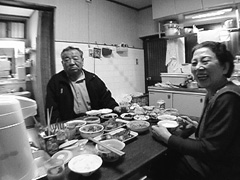Dear Pyongyang
 JAPAN / 2005 / Japanese, Korean / Color / Video / 107 min
JAPAN / 2005 / Japanese, Korean / Color / Video / 107 min
Director, Photography, Narrator: Yang Yonghi
Editing: Nakawoo Akane
Sound, Music: Inumaru Masahiro
Producer: Inaba Toshiya
Production Company, World Sales: CHEON
A second generation zainichi Korean director makes inquiries about the history of her activist father and mother. Over the years she records on video visits to her three brothers and their families, who migrated from Ikuno, Osaka to Pyongyang over thirty years ago, while reflecting on how she had been running away from the values her father forced upon her. She examines her ideological differences with her parents through the dialogue of making a film, and work them out, sincerely but with humour as well. In this way new family ties are knit. Now, mother and daughter look after the bedridden father together. The sight of the father weeping for his “homeland” from his hospital room will pierce the hearts of viewers.
[Director’s Statement] My three older brothers who “returned” to North Korea and my parents who devoted their lives to working for the General Association of Korean Residents in Japan (Chongryon) were the ones who opened my eyes to the issues faced by today’s society and times.
Since I was little, I have always been surrounded by words such as “mission,” “duty,” “loyalty.” The first song I memorized was Song to General Kim Il-sung. At school I was always taught, “you’d better be a heavyweight in the association like your father and mother, Yonghi” or “be loyal to your mother country where your brothers are living.” In front of the adults I was a good girl, but in my mind I was screaming to live life as I wished. I always wanted to be free from being ‘zainichi’, from being a member of the family, and from being a woman.
As time passed and I became an adult, I realized that “to be free” meant not just escaping from problems around me, but confronting them.
When I looked from their point of view at the lives of my parents and brothers who have been tossed about by history, I began to see personal stories hidden in their lives. Reflecting on my family’s history, I attempt to look anew at the moment and age I myself am living in. Beyond it, we may find the ‘something’ necessary for our survival and for our shared existence.
 Yang Yonghi
Yang Yonghi
Born in Osaka, Yang Yonghi is a second generation “zainichi” Korean. After receiving a master’s degree from The New School in New York, she worked as a teacher and theatrical actress, then became a radio personality. Since 1995, she started actively making films, mainly documentaries such as What Is Chima-Jeogori? and The Swaying Spirit, which were broadcast on NHK (Japan). She has also worked as a field reporter for TV news programs such as TV Asahi’s News Station, and has provided long-term, on-the-spot video coverage from Thailand, Bangladesh, China and various other Asian countries. Beginning in 1997, she spent six years in New York during which time she filmed various ethnic communities, and resumed work in Japan in 2003. |
